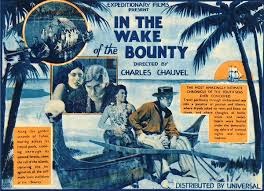 | |
| "Aye, those Tahitian women were lovely... or so I hear." |
 |
| "Avast! Who moved my cheese, Mr. Christian?" |
Unlike later depictions of the Bounty's notorious commander, here Bligh has lost a couple of stripes, being a Lieutenant instead of Captain. He's also something an 18th-century Capt. Queeg, ordering his crew flogged for allegedly stealing his cheese. Talk about being a petty officer!
 |
| "We love unhygienic white men!" |
Then another 10 minutes are devoted to the mutiny and its aftermath -- returning to Tahiti to pick up some babes and sailing to nowhere. But the men soon realize that a floating Plato's Retreat isn't all it's cracked up to be. As blind Michael Byrne puts it, "We drank heavily and fought over the women," which sounds an awful lot like your average New York bar any night of the week. Unlike the location shots, the "native girls" on board the Bounty are fully-dressed white actresses. It's an old Western custom: naked white women bad, naked darker women OK.
 |
| "Why did white men mate with the dark- skinned women of Tahiti"? Take a guess, Skippy. |
 |
| Not even all that cool native jewelry can ease Fletch's pain. |
 |
| "Don't worry, ladies, you'll be swooning over me soon enough." |
Two years later, Flynn's first starring role in an American movie, Captain Blood, was released, launching his legendary career. That same year, M-G-M released Mutiny on the Bounty starring Clark Gable and Charles Laughton, immediately becoming a seafaring classic. But In the Wake of the Bounty, little seen outside Australia, left no wake at all.
*********************

No comments:
Post a Comment